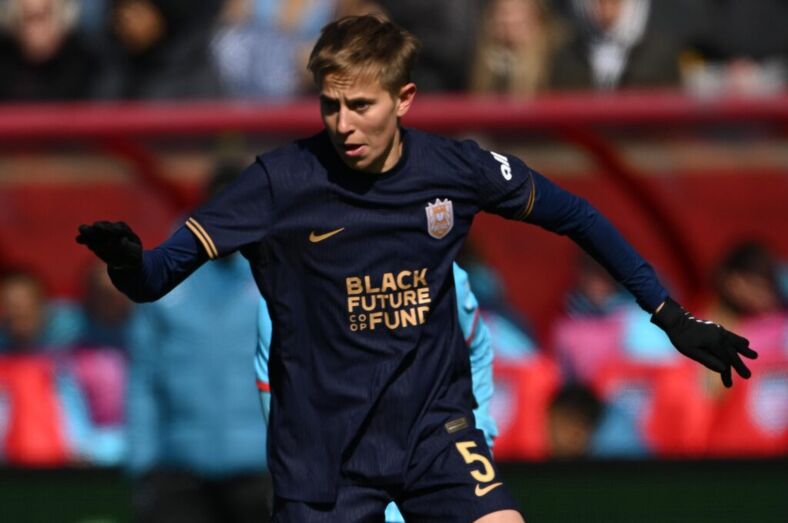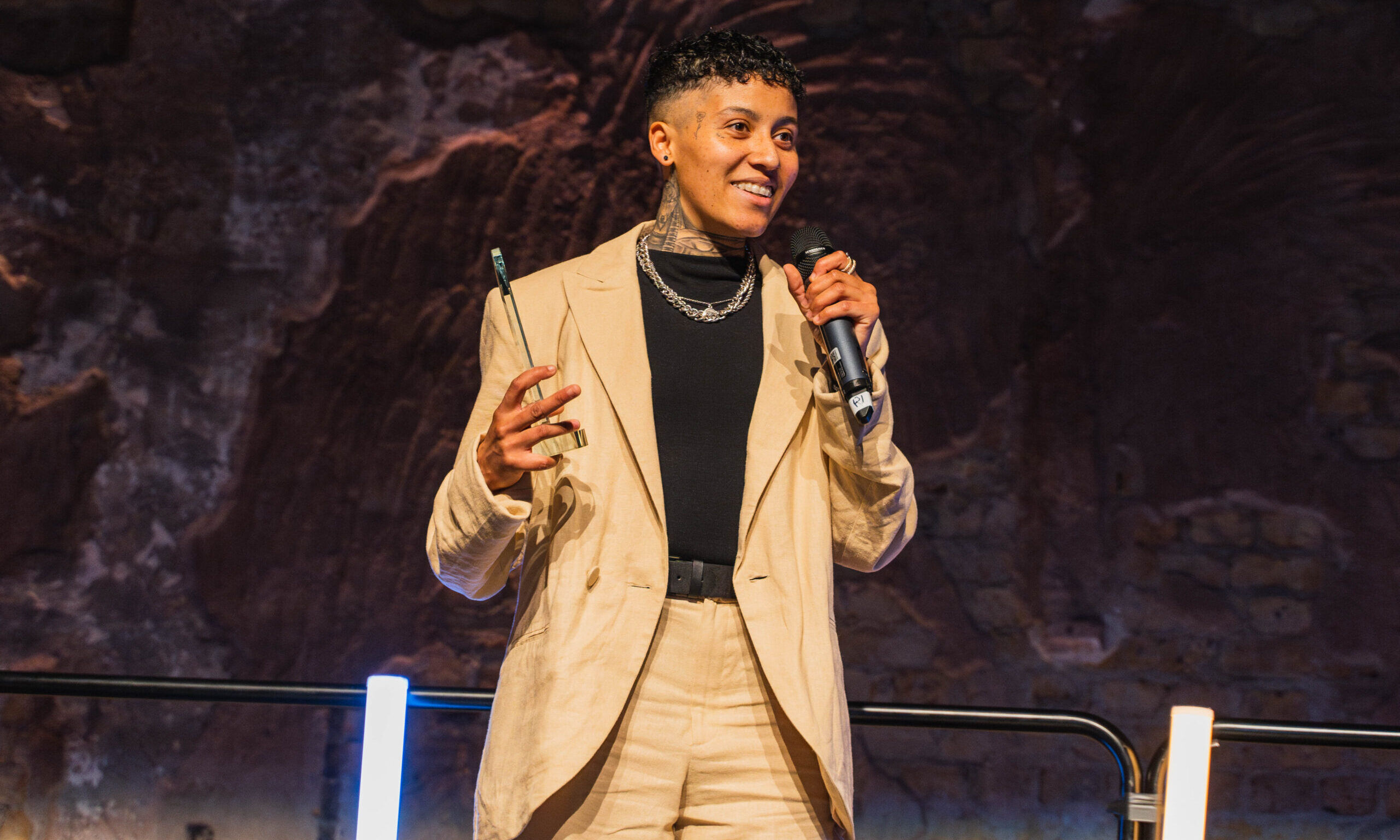When Caz Simone learned they had won the LGBTQ Award on the Football Black List — a long-running celebration of Black excellence in soccer, backed by the Premier League — there was an emotional reaction.
“I asked my mum to read the e-mail out and I got a little upset at first,” Simone tells Outsports. “She was surprised and asked me why I didn’t seem happy about it.
“I said that it just felt strange. These are two sides of my identity that I’ve struggled with.
“Being mixed race, there’s a whole conversation around which side I ‘fit’ into. Then there’s being in the LGBTQ community.
Get off the sidelines and into the game
Our weekly newsletter is packed with everything from locker room chatter to pressing LGBTQ sports issues.
“To see them merge was something I hadn’t considered because I’d never put my blackness and my queerness together before.”
Simone plays for Huddersfield Town at the third tier of the women’s game in England. Their story first came to wider attention three years ago when they started to post on social media about being nonbinary, having come out to friends and family.
They spoke to Sky Sports about changing their pronouns in football and the conversations that had come from that. Back then, it was Fields — their second name — that was appearing on teamsheets for Brighouse Town, the club they were playing for at the time.
BBC Sport also ran a feature about Simone when the midfielder’s TikTok channel was beginning to take off. To date, their posts have attracted over 5m views, mixing truth that blow up the binaries of society with other perspectives and sometimes self-penned poetry too.
The Football Black List honor is a recognition of how Simone has been helping others to understand intersecting identities via a platform that has a powerful reach.
“It’s taking two sides of something that I didn’t think would coexist, and maybe that’s part of my own prejudice,” they add.
“To have been represented at these awards, it does feel quite special.”
‘Quinn opens up questions’
In recent years, there has been a significant shift in U.K. soccer on inclusive language. Many clubs and leagues at grassroots levels across the country will explicitly state they are for women and nonbinary people, and will make it clear that trans women are welcome to play with and against them.
Higher up where Simone plays, the FA Women’s National League Northern Premier, the set-ups are semi-professional. Huddersfield train up to three times a week, with fixtures mostly on Sunday afternoons. Simone works shifts in a hardware store during the week.
There aren’t any other players who are out as nonbinary at the third tier or above, and elsewhere in the game, visibility is very thin.
Quinn, of Seattle Reign and Canada, is by far the best known through their Olympics and World Cup participation and more recently, Adelaide United’s Australia Under-20 goalkeeper Grace Wilson has shared their coming out story.
Simone isn’t surprised that it’s so rare for a person to speak publicly about having a diverse gender identity when they’re in the binary world of team sports.
In their case, they see themselves as LGBTQ in the first instance. “Because I’ve spent so long being out as a lesbian, it’s easier to see myself in the community, in queerness — that feels like my representation.
“Nonbinary is part of my identity but another big part was being out as a lesbian and fighting against that ‘box’ of being seen as a girl.”
Understandably, they are an admirer of Quinn — they play in a similar position on the field too — and they take note of how the Canada star challenges orthodoxies simply by existing.

“Any time I see anything to do with Quinn, there are comments like ‘men shouldn’t be in women’s sports.’
“It was the same with that piece I did on BBC Sport. Some people were saying stuff like, ‘if you want to play in women’s sports, get a sex change!’ They think that you were assigned male at birth and then suggest you’re trying to invade women’s spaces.
“That’s kind of the point of being nonbinary — it’s ambiguous, it’s androgynous, you can’t tell, you don’t know. And that amuses me. People look at Quinn and have an opinion on them but they’re getting people to talk about it. If anything, it’s broadening minds.
“I’ve been told, ‘you shouldn’t be at Huddersfield Women if you want to be a boy’, and also, ‘you shouldn’t be at Huddersfield Women if you were born a boy’. And then those two people have started having arguments in my comments about whether I was born a girl or a boy!
“I just leave them to it. At some point, they’ll have to open up a question in their own head — why do you think a look means a gender or a sex? But they’ve believed that their whole lives.”
The need for #FvT2024
The UK is this week marking the sixth annual activation of the Football v Transphobia campaign, a dedicated awareness drive that is part of the wider Football v Homophobia initiative.
New data released by Kick It Out, which gathers reports of all forms of discrimination in English football, shows a 150% increase this season in reports of transphobia in the pro game, grassroots game, and online.
Simone is conscious of hate spiking on social media and has also raised concerns about transphobic language and behavior in locker room environments.
“I’ve seen it myself in teams. It’s not necessarily been about me, but there have been times when I’ve gone to management to say something.
“A lot of people see trans and nonbinary as separate things, which means they feel comfortable saying their opinions to me. They seem to think, ‘oh well, you’re not transitioning really? You don’t know what you are.’
“That’s insulting in itself but I’ve seen quite a bit of it, and it’s a shame.”
It’s partly why TikTok is the perfect platform for Simone. They use it to create content that explains and educates LGBTQ experiences, often related to sports, in an accessible way.
As their views, likes and followers counts climb up, the difference they’re making can be measured. But there are offline moments that demonstrate the impact too.
“I went out in Manchester’s Gay Village not long ago and someone recognized me and came up to chat. They told me they’d come out through watching my videos and got quite emotional speaking to me.
“My mates wound me up about it later! But this person said they genuinely didn’t have a clue about identity. Then they saw my videos and it made them realize their own, and they wanted to say thank you.
“I was just stood there thinking, this is crazy to me because I used to be the one watching people online going, ‘oh my god, that’s me’, wishing I could say thank you to them.
“It doesn’t seem like I’m doing anything when I’m sat in my bedroom making TikToks, but then stuff like that happens and it makes you realize. It’s a nice feeling.”
Media manipulation
The first person Simone came out to was a close friend who was also the captain of one of their previous clubs.
Now their videos provide meaningful interactions that help to explain gender to others. Algorithms being as they are, however, means encountering users who aren’t particularly open-minded.
“I stitched one video where someone basically said that nonbinary people were “removing” themselves, as if men and women didn’t also feel that way,” they said.
“Nonbinary isn’t a third gender. It’s not a gender on its own — it encompasses so many different identities.
“You could be a man and a woman and still feel nonbinary. When people talk about it — and it’s not that you want to push this on them — but you almost want to say, ‘well, if you do feel like that, you could fit under the umbrella too!’
“Nonbinary doesn’t mean that you have to be trans. You can simply feel like you exist outside the binary because everything’s a binary.
“But people hop onto words, and they see a certain image, or a certain person.
“Then in mainstream media, it’s always someone who completely disagrees put up against someone who they know the audience is going to look at and perceive in a certain way.
“Media outlets do that on purpose and it creates a picture of ‘all nonbinary people have these views and opinions.’ It’s just not true.
“It’s the same for the other side — not every heteronormative straight person doesn’t accept trans and nonbinary people, but they put it out there in the media and people think we’re on two separate sides and we’re not! Most people sit in the middle and are impartial and don’t mind.
“If someone walked past who was nonbinary, those people in the middle wouldn’t somehow perceive that. But the media does like to push the other kind of narrative. It’s why we need more truthful journalism.”
The bigger picture
Simone works hard on the pitch to create space for others. But it’s been a tough season for Huddersfield, who have much wealthier opponents in their league like Newcastle, Nottingham Forest, Burnley and Wolves — all of whom are in the top four and have equivalent men’s teams that play in the Premier League.
Investment is needed to raise standards and make women’s football outside of England’s top two leagues more professional. Simone’s own future is uncertain beyond the summer, particularly if Huddersfield were to be relegated and saw their budget reduced.
Considering that situation, you’d think it would be the major talking point when the mainstream media reports on the game at this level. Instead, there are comparatively more articles written about MPs mobilizing to ban trans women from women’s sport — even lower down at grassroots — than there are about the finances of semi-pro sides.
Simone is an ideal person to ask about context and conversations about gender identity and gender expression. They can recall just one occasion in their career to date when an opposition team fielded a trans player.
They believe the fevered, sensationalist discourse around the topic is wildly out of sync with the mood within women’s football itself, and encourage people to step back and look at the bigger picture.
“Nine times out of 10, these people never speak on women’s issues,” says Simone.
“They’ll never have anything to say about sport until a trans person is involved, and then all of a sudden they want to protect women, whereas trans women are not a threat to women in general.
“If we want to talk about protecting women, we need to speak about many different things. There’s so much.
“I just feel that people actually involved in women’s football don’t have issues with trans inclusion.”
You can follow Caz on TikTok and Instagram. The Football v Transphobia Week of Action concludes on Trans Day of Visibility this Sunday.
Related


Quinn announces post-World Cup mentorship program for young gender diverse soccer players
While focused on winning Canada’s first Women’s World Cup, Quinn also prepares to grow their sport for young transgender and non-binary athletes.
By Ken Schultz | July 20, 2023








































